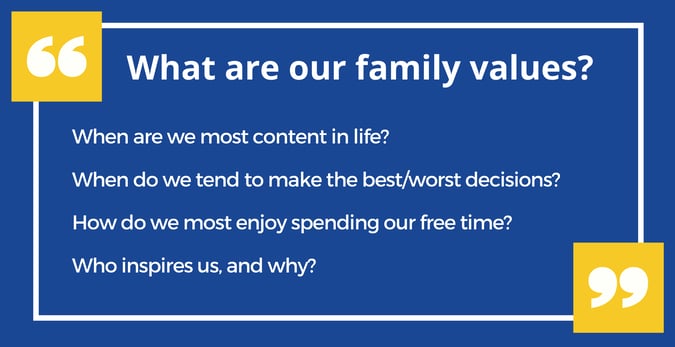The Science of Motivation: How to motivate your teen in three simple steps
As parents, nothing makes us more proud than seeing our children reach new heights. But let’s be honest—the struggle to motivate them is real!
5 min read
 EEH Team
:
02/03/2022
EEH Team
:
02/03/2022

As a parent, you want to find the educational experience that perfectly fits your child. You want to feel empowered and excited about your academic choice. However, sometimes the options can feel overwhelming. Public, charter, magnet, online, hybrid, private, homeschool—the possibilities are endless and can leave you wondering which path to choose.
This post will cover why your child’s educational experience matters, ways to identify that it’s time for an educational upgrade, the importance of family values in selecting your ideal education plan, and four ways to create the best educational experience for your family, both now and in the future.
Simply put, the right environment paired with the ideal learning style helps your student become intrinsically motivated and dedicated to things that grow their natural abilities and interests. It influences their education, success, and satisfaction for a lifetime. There's less nagging and far more joy when your child's education jives with who they are, the way they learn best, and with what they and your family value most. Making a change might feel scary, but you can take the lead in your family's educational experience.
Every student is unique, and it’s ridiculous to assume that all students learn best in the one-size-fits-all public school system. We believe education should spark creativity and a love of learning that will brighten your student’s day. If your student’s current school is not doing that, it may be time to switch schools or change things up.
An education should spark the imagination and encourage learning. If your student isn’t excited to learn, it is often the first sign that something needs to change.
Studies show that the success rate of students dramatically increases when they feel they have a mentor or someone they can talk to for support at school.
Students will learn more effectively when challenged and engaged in what they are learning. To better engage your student, classes should be matched with their academic level and interests.
Blog Post: How to motivate your teen in three simple steps
Connection is a core human need. Students learn best in an environment that is accepting, in addition to teaching and encouraging skills needed to build strong relationships.
When students are taught how to think, instead of what to think they are set up to be lifelong learners, and their education will better prepare them to learn at home and in the real world.
You may want more significant influence over subjects your student is taking or more flexibility to travel or enroll in extracurricular activities. You know best what your student needs and should tailor their learning to them.
If any of the above points resonate with you, it might be time to reevaluate their educational experience. To start, ask yourself these three questions:
View the Science of Motivation: Part 1 Webinar Recording
While asking the above questions is one piece of the puzzle, it’s also essential to determine your family values as you seek to find the best educational experience for your family.
By values, we don’t mean morals of right and wrong. We mean things that you and your family appreciate and treasure over other things. For example, one family might value adventure. Another might value cozy time at home. Neither of these examples is about morality; it’s about what brings satisfaction to your family life.
All tribes, businesses, governments, and families run on a set of values. These values might be stated explicitly or implied by how the group’s leaders and members behave. Either way, values have a significant impact on an organization's culture and the actions of everyone in it.
As parents, many of us unwittingly adopt the values of our childhood families. We also tend to embrace the values of those with whom we spend the most time today. As a result, many of us miss out on the opportunity to create an intentional family life.
In our experience, clarifying family values has been a process of reflecting on our behaviors, preferences, and long-term goals. Here are some of the questions we’ve used to determine values and to improve our own educational experiences in the process:

How can answering the above questions improve your child’s educational experience? When you know the answers to these questions, you can create opportunities for your child to flourish. You can optimize scheduling to keep them engaged, enroll them in experiences that interest them, and put them in the driver’s seat for their education.
By answering these key questions, you can also better understand and pursue family values as a team. With a key set of family values in place, you can pursue the ideal educational experience for your family. You’ll also find it easier to build and enjoy an improved family culture, more time together, and elevated communication patterns.
Defining a clear set of family values can be a powerful way to help teens and tweens feel grounded in times of rapid change. By answering the above questions and taking a serious look at your family’s values, you can be better prepared to make changes and elevate your family’s educational experience for years to come. So–how exactly can you do that?
Reflecting on these questions can influence what you hope for your student’s complete education.
All students are motivated to learn differently and finding a student’s ideal learning style and environment can make all the difference in their overall experience. The main four styles are visual, auditory, reading and writing, and kinesthetic. To determine which style they prefer, pay close attention to when they seem engaged versus disinterested.
Throughout the years, learning styles and preferences can change, making it necessary to reevaluate and revamp your family's educational experience regularly.
Finding a community of like-minded parents who value education can provide a well-needed boost along your journey to better your family’s educational experience.
How can you create or join an educational community? Social Media groups, PTAs, and homeschool co-ops are a great place to start. In addition, becoming involved in other areas of your community can lead to opportunities with education-specific initiatives.
The more you know, the more you’ll feel empowered. Whether it’s a webinar focused on motivating your teen or a full-day conference featuring education experts and thought leaders, the right resources can leave you feeling empowered and ready to make necessary changes for your family’s education.
Creating the ideal educational experience for your family won’t happen overnight. It will take time and dedication to answer critical questions, evaluate where you’re at, and determine where you’d like to be. If you have more than one student, it’s even more imperative to create a family educational experience that caters to each student and plays to their strengths.
Thankfully, you don’t have to go it alone.
Education Empowerment Hub provides a community of parents, educators, and academic institutions as resources for building your child's ideal educational experience. Our webinars, conferences, and other resources focus on giving you the tools, information, and know-how to support your child.
Want in-person access to more tools, resources, and inspiration? Come to the Education Empowerment Conference on May 21, 2022. Here, you'll have access to curriculum, education programs, and inspiring speakers that will help you navigate and find the right educational choices for your family.

As parents, nothing makes us more proud than seeing our children reach new heights. But let’s be honest—the struggle to motivate them is real!
![How to take the lead in your family’s educational experience [Free Webinar Recording]](https://8517951.fs1.hubspotusercontent-na1.net/hubfs/8517951/AdobeStock_338796157.jpg)
With a new semester already in swing, motivating your teen might be at the top of your mind. Last week, we covered common misconceptions of...

Every family has a culture, whether they realize it or not. Your family culture is your family's traditions, habits, practices, and values. It...